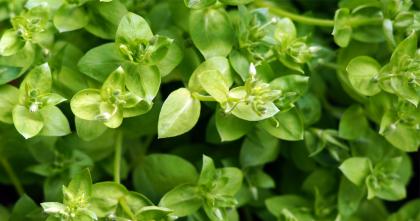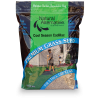Don't neglect your lawn during the colder months.
The First Step to Controlling Winter Weeds: Don't neglect your lawn during the colder months.
While lawn maintenance and care may not seem like a priority during the dead of winter, it's important to keep your lawn on track for an optimal start to spring. Monitor your lawn throughout winter for particularly hardy weeds which thrive in colder temperatures.
What Contributes to Winter Weeds?
Weeds thrive in certain environmental conditions. Depending on your region’s winter weather, your lawn may be prime for winter weeds during warmer bouts, when air temperatures are as low as 60°F and soil temperatures are as low as 50°F. Poorly-draining or water logged soils especially, provide opportunities for winter weeds to thrive.
How to Kill Winter Weeds
Make sure to remove winter weeds as soon as possible, and take precautions like clearing out any dead plant matter which can be a breeding ground for winter weeds. Additionally, winter is a great time to apply winter pre-emergent weed control before the weeds have time to take over.
Control Winter Weeds Before They Start
The best defense against any weed is a strong and healthy turf, which starts with high-quality seed. Utilize Natural Alternative grass seed for your lawn to achieve a thicker, denser turf which can fight off weeds all year long. Natural Alternative® seed comes with zero weed-filler and is Blue Tag Certified, ensuring that your seed selection matches the label on the bag, without alternative varieties. Utilize our seed in the fall to overseed your lawn and help crowd out weeds throughout the winter.
For warm season lawns without the need for overseeding, proper mowing will be your best chance to eliminate winter weeds. Proper mowing will establish a healthy turf foundation and discourage weed growth naturally. Be sure to mow your lawn at the correct height, always with a sharp blade to avoid ripping the blade and ending up with brown tips which can introduce disease. This will help create an inhospitable environment for winter weeds to thrive in.
What Are Some Common Winter Weeds?
Chickweed
Common chickweed is an annual winter weed which thrives in damp locations, mulched areas, under tree shade and in gardens. Chickweed can survive freezing temperatures and proves difficult to control even during freezing temperatures, as it blooms throughout winter. Control practices for chickweed include ensuring proper drainage, completing aeration and overseeding in the fall, and not overapplying nitrogen to your lawn. Utilize Natural Alternative’s pre-measured fertilization programs for balanced, slow feeding of your lawn to avoid a surplus of nitrogen in the soil.
Corn Speedwell
Another winter annual weed, corn speedwell flowers in winter and germinates in the fall. Corn speedwell can spread quickly and become problematic during particularly mild falls. Growing in thin, damaged turfgrass and in nutrient-deprived soils, corn speedwell thrives in lawns which have been neglected and lack fertilization programs. Corn speedwell is controlled similarly to chickweed, by ensuring proper soil nutrient levels with a balanced fertilization program, in addition to aeration and seeding.
Henbit
Henbit is an especially common winter annual weed, and can easily be confused with the similarly-appearing purple deadnettle. If left undisturbed, henbit can grow up to a foot in height or taller. Henbit frequents areas of the lawn with poor turfgrass coverage, much like corn speedwell. Newly-seeded lawns may be susceptible to henbit, in addition to dormant warm-season lawns featuring Bermuda, St. Augustine, or Centipede grass. To best control henbit in all lawn types, aerate your lawn and ensure adequate drainage.
Taking care of your lawn during winter is essential if you want to avoid winter weeds. Start now and be proactive to ensure a weed-free winter season! For more information, sign up for our e-newsletter, The Monthly Dirt, follow our social channels or give us a call today.





